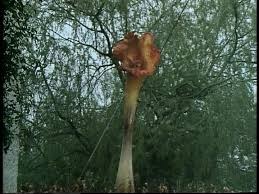My starting place was to determine what made a sentient plant different from an animal (maybe I'm dense? Took me a while). Here's a starting place for differences between the two. http://www.mcwdn.org/Plants/PlantsDiffer.html
Basically:
A. Plants don't move
B. Plants make their own food
C. Plants give off oxygen and take in CO2
D. Plant cells have cell walls and other "planty" structures
E. Plants have only basic abilities to sense
Of course, I can think of exceptions, for example, some carnivorous plants don't make their own food, can move, and can sense objects pretty well.
Because they're sentient, they need to be able to interact with their environment (smart, paralyzed races don't seem likely to last, and are unlikely to be intergalactic), so A and E are out. So let's say that to make a plant, we'll need them to make their own food from the sun, and they need planty-parts in their cells, viz. chloroplasts to make food and cell walls.
So they're going to be a lot more animal-like than some animals, but with ability to make their own food.
Plants (along with...pretty much any other life form) have 3 major needs:
- Reproduction
- Food
- Water
Reproduction: Most plants reproduce using insects to transfer vital bits of DNA (trying not to be too graphic). Much of the plant's structure is devoted to this - in fact, anything that isn't root or leaf is probably connected to reproduction. So fruits, flowers, sugar-filled-liquid-producing organs, and bright colors would probably cease to exist if plants had a different way of reproducing.
Food: Plants can mostly make their own food. But to do this, they need periods of sun and darkness. Also water, CO2, and O2, if my memory serves correctly. You'll also need a pretty large amount of sun-facing surface. The nice thing with a plant is that mostly they need to make sugar, so carbon, oxygen, and hydrogen are pretty much all they need to function nicely. For repairs, they will need other elements, but these are largely gotten from soil and seem to be widely available. So making food isn't a problem, but storing food could be. Your plant-people will need some type of "camel hump" for sugars. Many plants use roots for this.
Water: Plants need a pretty steady supply of water. This seems to be the biggest problem preventing plants from moving - traditionally, a massive root system ensures a steady water supply. Trouble is, massive root systems are hard to move.
Plant Society
I'm going to keep my imaginary Plantains pretty "planty." Of course, if you want to slap some chloroplasts on an animal, I'm cool with that. But then, it wouldn't really be flora would it?
I can see two possible primitive plant societies. Later histories could be extrapolated from these initial points.
Plant Nomads. A group of (probably) small sentient plants with minimal root systems that move around, following water sources and rainy seasons.
Stationary Plant Societies. Plants develop a way to pass along knowledge to seeds and send them out, much like coral polyps, to establish new colonies. The older plants would be stationary once their roots developed. Some motion might be possible by selective growth and allowing parts to die. But that would be on a months-to-centuries timescale.
In either case, I can think of a few interesting features of such a society:
No family units. Since plants have almost no control over breeding, there wouldn't be families. Sexual prohibitions would not exist, generation differences would not be nearly as obvious. Genders roles would be more balanced. Mixed races could be an interesting social problem (half-sentient plants?), though many plant combinations can't produce viable offspring.
Relationships. Inter-plantain-ial relationships could get interesting. "Hermit" plants by choice would probably be rare, but once you're in a group, you're pretty stuck. Plants would have great emphasis on applied psychology and conflict resolution skills.
Reduced desire for exploration. Because plants need water, huge swaths of the world would remain unexplored, at least until specially engineered plants with water-carrying abilities could explore rockier/less rainy areas. Maybe this wouldn't become a cultural norm, but it would be the initial mindset.
So what would plants do? Plants really wouldn't have the "survival struggle" animals have. Food production is pretty passive. There would be a high emphasis on proper shelter (windbreaks, erosion prevention, temperature stabilization). Aesthetics would be important. Lots of thinking would occur, so plants would focus on philosophy before applied sciences. "Thought is cheap, action is expensive" would probably become a mantra.
No need-based economy. Because food is free, and necessities are minimal, the focus wouldn't be on needs as much as on services (like a doctor for when you get buried in a landslide). Maybe plants are the perfect candidates for a communist system.
Honestly, I don't see anything that can fly a spaceship being very plant-like. That's probably just the limits of my imagination, but a plant's sheer mass-to-movement ratio seems to preclude the rapid responses needed to develop early flight.
But, they'd be tough to beat. Once they came to a new world, seeding it could be done easily, and from a high altitude. And plants are notoriously tough to kill. Especially since they have the advantage of cell walls and the ability to regenerate from small pieces.

